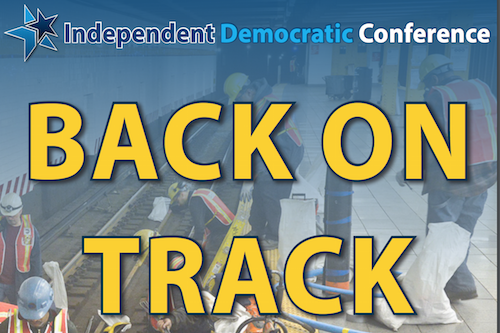State Senate Independent Democratic Conference (IDC) Chair Senator Jeff Klein (D-Bronx/Westchester) today introduced legislation to direct $428 million in New York City sales tax to fund its share of Phase 1 of the MTA’s Subway Action Plan.

The bill comes as Mayor Bill de Blasio has steadfastly said the city have to pitch in for any of the much-needed subway repairs and it is a state problem. The state has already committed to pitching in an equal $428 million to finance the critical plan.
The measure also comes on the heels of an IDC survey that found 75 percent of subway riders want the city to pitch in funds for MTA repairs.
“New York City straphangers have suffered enough delays and we cannot delay funding this project anymore. This shared financing immediately infuses the MTA with desperately needed cash to fix broken signals and tracks. The state already stepped up with its share, and the city, whose residents use the system daily, must share in the responsibility for maintaining it. If New York City riders think the ‘summer of hell’ was bad, we’re going to have every season of hell if we don’t take imminent action,” said Klein.
The city collects over $7 billion in sales tax annually through purchases like prepared food, clothing over $110, parking, electronics and beauty services. The city also ended the last fiscal year with a $4 billion surplus.
The legislation captures an infinitesimal six percent of city sales tax, for a one-time need, in order to make desperate repairs to a degraded subway system that serves its residents and businesses.
The Transit Workers Union also backed the IDC proposal.
“New York City subway riders need an immediate solution to the financing gap that exists. The proposed legislative solution by Senator Klein and the members of the IDC conference is a rational and sensible solution to the MTA’s shortfall, and should be adopted,” said TWU Local 100 President Tony Utano.
Phase 1 of the MTA’s Subway Action Plan includes repairs to 1,300 broken signals, which are often a cause for delay. The agency would use this funding to address serious track issues, and dedicate additional workers and increased emergency response teams for repairs. Triple-time welding work on rails, with increased track welding capacity, is also included in the first leg of the plan.


Phase 1 needs a short-term revenue stream, whereas, future infrastructure concerns would rely on other methods under consideration for long-term financing.
“As we previously heard during transportation budget testimonies, our public transit system is in crisis. We need fair and equitable solutions now, not bickering,” said Sen. Diane Savino (D-Coney Island, Sunset Park, Bensonhurst, Staten Island).
“This report underscores the fact that the common-sense solutions we need to tackle the failings of our subway system have broad public support. The maintenance, reliability, safety, and other key Phase 1 initiatives require the State and the City to work in partnership. The millions of subway riders who depend on this critical pillar of mass transit are counting on us to act,” said Senator Jesse Hamilton (D-Central Brooklyn).










